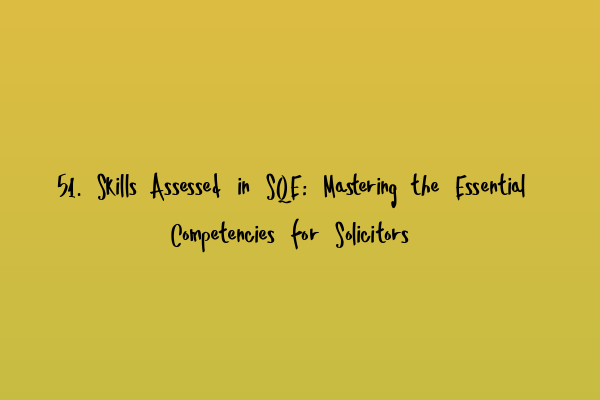51. Skills Assessed in SQE: Mastering the Essential Competencies for Solicitors
The Solicitors Qualifying Examination (SQE) is a comprehensive assessment that evaluates candidates on their ability to demonstrate the essential competencies required to become a qualified solicitor. In order to excel in the SQE, it is essential to understand the key skills that are assessed throughout the examination process.
In this blog post, we will explore the 51 skills that are assessed in the SQE and discuss how you can master these competencies to enhance your chances of success. Whether you are preparing for SQE1 or SQE2, these skills are crucial for your development as a solicitor.
1. Legal Knowledge
The foundation of any successful solicitor lies in their understanding of legal principles, concepts, and procedures. SQE assesses candidates’ knowledge across various areas of law, including contract law, criminal law, tort law, and more. Familiarizing yourself with these legal topics and ensuring a strong grasp of key principles will lay a solid foundation for your success in the SQE.
2. Analytical Skills
Analytical skills are paramount for solicitors, as they enable you to carefully review and interpret complex legal information. SQE assesses your ability to identify relevant facts, apply legal reasoning, and draw logical conclusions. Enhancing your analytical skills through practice and critical thinking exercises will greatly benefit you in the SQE.
3. Problem-Solving
Solving legal problems is a fundamental task that solicitors undertake on a regular basis. The SQE evaluates your ability to identify, analyze, and propose solutions to legal issues. Developing your problem-solving skills by engaging in case studies, mock scenarios, and practical exercises will help you excel in this competency.
4. Legal Research
Effective legal research is essential for solicitors, enabling them to find relevant information and precedents to support their cases and advisory work. The SQE evaluates your ability to conduct legal research efficiently and accurately. Familiarize yourself with legal research techniques and online resources to strengthen your proficiency in this skill.
5. Drafting
Drafting is a vital skill for solicitors, as it involves preparing legal documents such as contracts, pleadings, and letters. The SQE assesses your ability to draft clear, concise, and legally accurate documents. To enhance your drafting skills, practice writing various legal documents and seek feedback from experienced professionals.
6. Advocacy
Advocacy skills are crucial for solicitors who engage in courtroom litigation or represent clients in dispute resolution processes. The SQE evaluates your ability to effectively present legal arguments, cross-examine witnesses, and communicate persuasively. Engaging in advocacy exercises, mooting competitions, and mock trials can significantly enhance your advocacy skills.
7. Interviewing and Advising
Clients rely on solicitors to provide sound legal advice and guidance. The SQE assesses your ability to conduct client interviews, identify their needs, and offer appropriate advice. Role-playing scenarios and practical exercises can sharpen your interviewing and advising skills, enabling you to excel in this competency.
8. Negotiation
Negotiation skills are vital for solicitors who engage in mediation, settlement discussions, and contract negotiations. The SQE assesses your ability to negotiate effectively, reaching mutually beneficial agreements for your clients. Participating in negotiation simulations and workshops can help you develop and refine your negotiation skills.
9. Professional Ethics
As a solicitor, maintaining high ethical standards is essential for client trust and professional integrity. The SQE assesses your knowledge and understanding of professional conduct rules, confidentiality, and conflicts of interest. Familiarize yourself with the Solicitors Regulation Authority (SRA) Code of Conduct and ethical scenarios to excel in this competency.
10. Communication
Effective communication is a core skill for solicitors, enabling them to interact with clients, colleagues, and stakeholders. The SQE assesses your ability to communicate clearly, concisely, and professionally both in written and oral formats. Practicing written and oral communication exercises, such as mock interviews and presentations, will enhance your communication skills for the SQE.
11. Time Management
Solicitors often work on multiple cases simultaneously, requiring excellent time management skills. The SQE assesses your ability to prioritize tasks, meet deadlines, and efficiently manage your workload. Developing effective time management strategies and practicing time-sensitive exercises will strengthen your skills in this area.
12. Client Care and Professionalism
Providing exceptional client care and maintaining professionalism are critical aspects of a solicitor’s role. The SQE assesses your ability to demonstrate empathy, confidentiality, and respect for clients. Understanding the importance of ethical client care and engaging in role-play scenarios can help you excel in this competency.
13. Business and Financial Awareness
Solicitors need to have a basic understanding of business and financial concepts to effectively advise clients on transactions, contracts, and regulatory matters. The SQE assesses your knowledge of business structures, financial statements, and risk assessment. Familiarize yourself with relevant business and financial concepts to thrive in this competency.
14. Management of Files
Organizational skills are crucial for solicitors to manage extensive files and documentation associated with legal matters. The SQE assesses your ability to organize, maintain, and retrieve files efficiently. Developing effective file management systems and practicing file organization exercises will assist you in mastering this competency.
15. Adaptability
Being adaptable is important in the legal profession, as solicitors often encounter unpredictable situations and changing circumstances. The SQE assesses your ability to adapt to new challenges, work under pressure, and think on your feet. Engaging in diverse legal scenarios and undertaking time-sensitive exercises can enhance your adaptability skills.
These are just some of the essential competencies assessed in the SQE, highlighting the broad range of skills required to excel as a solicitor. By mastering these skills and dedicating sufficient time to their development and practice, you can significantly enhance your chances of success in the SQE.
If you’re interested in learning more about specific aspects of the SQE, check out these related articles:
